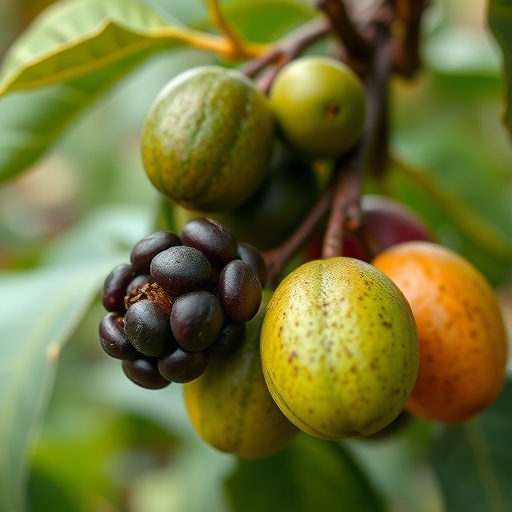
In a groundbreaking investigation into coffee fermentation methods, researchers from the Federal University of Uberlândia (UFU) have revealed that unripe coffee beans, typically discarded due to their inferior taste profiles, can be transformed into specialty-quality beverages through an innovative fermentation approach. This study, which appears in the journal Food and Bioprocess Technology, explores the potential of anaerobic fermentation to enhance coffee flavors and aromas, offering new insights into both agricultural practices and the specialty coffee market.
Traditionally, specialty coffees are defined by their impeccable quality, scoring above 80 points in blind tasting trials conducted by professional tasters. Greenish beans, often deemed unworthy for specialty classification, impart astringent flavors that are unpleasant to consumers. As such, coffee growers have long sought methods to improve the quality of these immature beans. The novel study led by Luiza Braga investigates how a self-induced anaerobic fermentation (SIAF) technique can turn imperfect beans into exceptional drinks, thus appealing to coffee connoisseurs.
The research involved various fermentation processes applied to the Arara cultivar of Arabica coffee, specifically assessing both ripe and unripe beans. By employing SIAF, in which beans are sealed in bioreactors devoid of oxygen, the microbial action triggered by fermentation results in the production of distinctive flavor profiles. Not only did the resulting beverages surpass the sensory characteristics of those made with only ripe beans, but they also met the strict criteria established by the Specialty Coffee Association (SCA).
.adsslot_Xp5BLQDzTc{width:728px !important;height:90px !important;}
@media(max-width:1199px){ .adsslot_Xp5BLQDzTc{width:468px !important;height:60px !important;}
}
@media(max-width:767px){ .adsslot_Xp5BLQDzTc{width:320px !important;height:50px !important;}
}
ADVERTISEMENT
A series of blind cup tests evaluated the beverages produced from unripe beans. Professional tasters, known as Q-graders, were surprised to find that many samples scored above the threshold for specialty classification. Braga attributes this unexpected outcome to the carefully controlled fermentation conditions, which allowed the natural microorganisms within the fruits to flourish. This assertion is further bolstered by the addition of specific inoculants that enhanced the fermentation process in some experimental trials.
The methodology involved placing freshly harvested coffee fruits into 200-liter polystyrene barrels, hermetically sealing them for up to 96 hours. The lack of oxygen creates a conducive environment for anaerobic fermentation, resulting in biochemical reactions that alter the flavor and aroma of the coffee. This study introduced controlled variables such as fermentation duration, temperature, and pH, leading researchers to optimize conditions to minimize any adverse effects of using unripe beans.
Through their investigation, Braga and her team discovered that managing external temperature at a consistent 27 °C during fermentation notably elevated the sensory scores assigned by tasters. This underscores the significance of temperature control and careful monitoring throughout the fermentation process. Using a cutting-edge electronic device developed for this research, team members could track pH and temperature in real-time, ensuring minimal intrusion during experimental trials.
The innovative strategies emerging from this research not only improve the quality of underutilized beans but also introduce a lucrative opportunity for coffee growers to increase the marketability of their products. The work is part of a broader initiative that underscores the importance of anaerobic fermentation methods for maximizing the value of coffee produced, potentially fetching higher prices in an increasingly competitive market.
To support this new approach to coffee processing, Braga’s research was conducted in collaboration with various funding partners, including the São Paulo Research Foundation (FAPESP) and the Brazilian Innovation Agency. The project embraces a multidisciplinary perspective, showcasing the intersection of agricultural science, biochemistry, and food technology to address longstanding challenges in coffee production.
The study holds significant implications for the future of coffee cultivation, particularly concerning the Arara cultivar, which was designed for resilience against pests and diseases. With its citrus notes and complex body, this coffee variety offers the potential for new flavor profiles as enhancements from fermentation methods are explored. The ongoing investigation aims to identify specific compounds produced during fermentation that contribute to the unique sensory qualities of the coffee.
Research like this contributes to a growing body of knowledge regarding the relationship between fermentation and flavor development, which may spawn further innovations in the food and beverage industry. Understanding how anaerobic fermentation can elevate the quality of typically discarded coffee beans reveals just one facet of the untapped potential within agricultural practices.
As the research community delves deeper into the science of coffee fermentation, new methods and technologies will likely reshape the landscape of coffee production and consumption. By bridging the gap between traditional practices and modern innovations, researchers are not only expanding the palates of coffee lovers around the globe but are also paving the way for sustainable agricultural practices that enhance flavor while promoting environmental stewardship.
This remarkable study serves as an exemplar of how science can redefine food systems, showcasing the pivotal role of innovation in unlocking the true potential of ingredients that have long been undervalued. As this research gains traction within the scientific community and the coffee industry, it’s anticipated that coffee lovers will soon experience flavors and aromas previously thought impossible from unripe beans.
In conclusion, the research conducted by Luiza Braga and her colleagues presents a transformative approach to coffee production, shedding light on how sophisticated techniques in fermentation can marry environmental sustainability with culinary excellence. As the specialty coffee market continues to grow, the insights gained from this study may well influence future practices in both agriculture and the brewing of coffee, many years after its publication.
Subject of Research: Fermentation of immature Arara coffee beans for specialty coffee production
Article Title: Transforming Challenges into Quality: The Power of Controlled Fermentation in Immature Arara Coffee Beans
News Publication Date: 16-May-2025
Web References: Food and Bioprocess Technology
References: FAPESP, Federal University of Uberlândia
Image Credits: Da Semente à Xícara Group/archive
Keywords
Coffee, Fermentation, Biochemistry, Food Science.
Tags: agricultural practices for coffee growersanaerobic fermentation in coffeeArara cultivar coffee researchbioreactor fermentation methodscoffee connoisseur preferencesenhancing aromas in coffee beveragesimproving coffee flavor profilesinnovative coffee processing techniquesself-induced anaerobic fermentationspecialty coffee market transformationspecialty coffee quality assessmentunripe coffee beans fermentation





